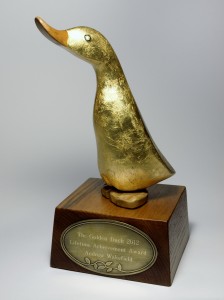Adam Finn, Professor of Paediatrics at the University of Bristol, had this to say upon hearing of Wakefield’s victory in the Golden Duck:
In the past, a small minority of people thought that vaccines were unsafe, unnecessary and/or unnatural. However, a large majority accepted them as one of the many benefits of modern life, alongside central heating and mobile phones. Luckily for the few doubters, the majority (a majority of a size politicians can only dream of) protected them too, as a result of so-called herd immunity.
That all changed in the 1990s when the widely-reported doubts of one rogue doctor punched a massive hole in public confidence in one of our safest and most effective vaccines against measles mumps and rubella. While the misinformation has finally been corrected and MMR coverage rates in children reaching immunisation age have gradually recovered to pre-Wakefield levels, the legacy is many, many thousands of unimmunised children born over the last 15 years whose parents decided MMR was too risky at the time and subsequently have forgotten all about it. Measles rates are up and they will only decline when this accumulation of susceptibles has either had the vaccine or the disease.
The same is true of mumps and we watch nervously for signs of a rise in rubella and, with it, the devastation it brings to the unborn children of pregnant mothers who get the disease.
In medicine, the personal legacy most of us hope for is to have brought some benefit to our patients. A few make genuine advances in treatment and prevention. Doctors and scientists who have played their part in the development of safe effective vaccines are among those who have done most, although their beneficiaries aren’t personally aware of the suffering they avoided. They changed history – but the only history we have is the one that happened.
So in handing the wooden spoon, or rather Golden Duck, to one who got it so badly wrong, let’s remember for a moment the countless millions worldwide who are now alive and healthy because of vaccines. Only for a moment – then get on with our busy lives and leave vaccines to do their job in the background.


